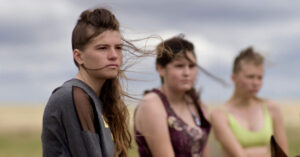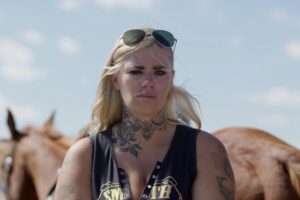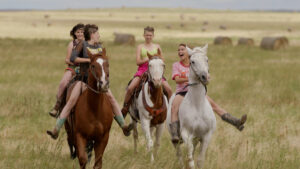Publication Date: 08-16-2025
East of Wall (2025) review
Dir. Kate Beecroft
By: Steve Pulaski
Rating: ★★★
Having spent significant time in downstate Iowa, where my girlfriend’s family resides, I’ve come to learn a little about horse/ranch culture. These are people who know nothing but struggle. They are perpetually broke and in debt, they live unglamorous, laborious lives, and occupy their time with westerns, local gossip, and toxic (and often false) political beliefs. They are deeply passionate about their horses all while wondering how the bills they inevitably incur are going to be paid. Conversely, my connection to horses has been the occasional trip to the racetrack to place mindless wagers on ones that have the most memorable names.
This hard-knock life is the center of Kate Beecroft’s impressive debut East of Wall. Its title is a reference to the fact that the story takes place east of the 600-person town of Wall, South Dakota. Most films of this ilk center around the men in these worlds; they’re heavily fictionalized tributes to the mythos of the grizzled American cowboy. Here’s a film that shows the brave women in these enclaves, as Beecroft successfully convinced the Zimiga family — single mother Tabatha and her daughter, Porshia, a rodeo queen and TikTok video-maker — to be an integral part of her docufiction drama about their lives.

A presence unto herself, complete with tattooed arms and her half-shaved head of long, flowing blonde hair, Tabatha is the matriarch of her assembled family. She has three children of her own, but takes in other kids, many of them Native American, from broken homes to live on her 3,000-acre ranch. While quick to get her many kids on horses, she hesitates to get back in the saddle herself following the death of her husband, John. Part of it is grief; another part is the worry that an injury would prevent her from caring for both her horses and her herd of children.
Often reticent and sulky, Porshia resents her mother for the death of John, who taught her how to ride and cared for her peers in a way better than her biological father ever did. East of Wall drops us into this world by way of various vignettes that harbor unquestionable authenticity on top of a lived-in quality in their naturalism.
Tabatha has been strapped for cast, and horses at local livestock auctions aren’t bringing what they should, regardless of how good of a show her kids put on when they get in the ring. Enter Roy Waters (Scoot McNairy), a wealthy rancher who rolls into town with his six-door, triple-cab truck with intent to acquire the Zimiga ranch.

Tabatha’s relationship with all the little ones — who range in age from three-years-old to budding adults — is one of the strong points in the film. One of many subplots involves her efforts to become the legal guardian of Jesse (Jesse Thorson), whose father is incarcerated. When she gets her hands on a letter that says Jesse is in danger of having to repeat the 11th grade, she lashes out at him, stating clearly that if she adopts him, there’s a certain set of rules he has to follow. “That’s why I want to live here,” Jesse tells her. He needs structure, and while Tabatha might not think she is the best at providing it, she’s instinctively maternal and allows these kids opportunities to grow and develop as individuals.
Amongst Tabatha’s children is Chancey Ryder Witt, who won Miss Ogala Lakota Nation Rodeo Queen in 2023. She’s spunky and charismatic, and has a great moment with Tabatha and her mother (played by a funny, foul-mouthed Jennifer Ehle) on their front porch. Some of the most enthralling scenes are ones involving the kids splashing in the mud, riding horses, and having a blast, all while familiar TikTok bangers (such as Shaboozey’s “Tall Boy“) boom in the background.
Of course, there are scenes of real sadness and struggle. None hit harder than when Tabatha and her frontier female friends (including her real-life mother, Tracey Osmotherly) gather around a campfire to smoke, drink, and shoot the shit. As is the case with friends you trust implicitly, the conversation turns deep, with the women recounting abusive partners. This leads Tabatha to recount the death of John in explicit detail, right down to the immediate aftermath. Considering this is Zimiga’s life story put to film, shot on location at her ranch, this moment is as uncommonly raw and genuine as you’re likely to find in any American film this year.

Beecroft’s treatment of the Zimiga family feels adjacent to that of Larry Clark’s in films like Kids and Wassup Rockers. She’s less concerned with cohesion and more fixated on mood and tone. East of Wall is akin to an impressionistic painting, giving you essences and poetic moments of emotion. As is often the case with this structure, it can leave you wanting. More time could’ve been spent developing Tabatha’s biological and adoptive children. Porshia’s narration ties together the badland beauty of their region of South Dakota, but it might’ve been better to leave those moments sparse, with gentle music.
This is a film about the simultaneous beauty and pain of the wide open western region of the country, and most importantly, East of Wall doesn’t try to make naturally ugly moments beatific. It revels in the short-lived fun, commits to showing the drudgery and the hurt that this world can bring, and all the while gives a lovely crew with whom to spend time. For someone lacking professional acting experience, Tabatha Zimiga is a total natural. She is magnetic in her presence, and has the stature of a frontier woman who has seen it all yet internalizes a lot. Beecroft effectively gives this woman a film that feels like a reflection of herself. It ain’t always pretty, but it’s real.
NOTE: I had the privilege of chatting with Tabatha Zimiga, the star of East of Wall. Take a listen to the interview below!
Starring: Tabatha Zimiga, Porshia Zimiga, Scott McNairy, Jennifer Ehle, Jesse Thorson, Chancey Ryder Witt, Clay Pateneaud, Leanna Shumpert, Brynn Darling, Ryan Caraway, and Tracey Osmotherly. Directed by: Kate Beecroft.
About Steve Pulaski
Steve Pulaski has been reviewing movies since 2009 for a barrage of different outlets. He graduated North Central College in 2018 and currently works as an on-air radio personality. He also hosts a weekly movie podcast called "Sleepless with Steve," dedicated to film and the film industry, on his YouTube channel. In addition to writing, he's a die-hard Chicago Bears fan and has two cats, appropriately named Siskel and Ebert!


